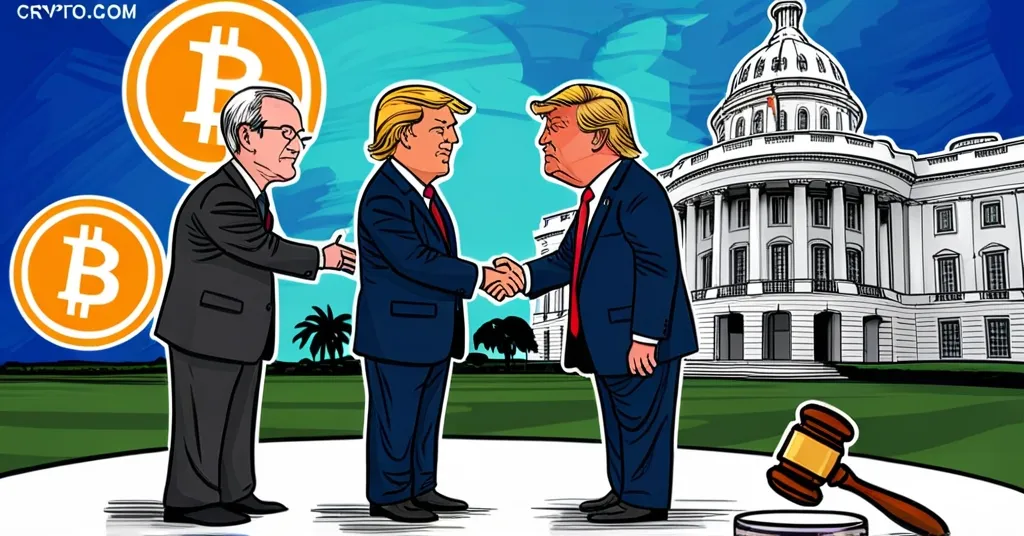Crypto.com CEO Meets Trump: Federal Bitcoin Reserve and SEC Chair Shake-Up on the Horizon

Crypto.com CEO’s Meeting with Trump Sparks Speculation on Crypto Regulations
In a surprising turn of events, Crypto.com CEO Kris Marszalek had a meeting with President-elect Donald Trump at the Mar-a-Lago estate in Florida. This high-stakes conversation resulted in Crypto.com withdrawing its lawsuit against the U.S. Securities and Exchange Commission (SEC), raising questions about the future of cryptocurrency regulations in America.
- Key Figures: Kris Marszalek and Donald Trump
- Core Agenda: Establishing a federal bitcoin reserve and fostering a crypto-friendly regulatory environment
- Immediate Effect: Crypto.com dropped its lawsuit against the SEC
- Regulatory Shift: Potential replacement of SEC Chair Gary Gensler with Paul Atkins
Meeting Highlights
At the core of Marszalek and Trump’s discussion was the idea of creating a federal bitcoin reserve. In simple terms, this would involve the U.S. government holding a stockpile of bitcoin, potentially adding legitimacy to the cryptocurrency and integrating it into the national financial system. Such a move could mark a significant step towards mainstream acceptance of digital currencies.
Additionally, the meeting focused on shaping a more welcoming regulatory framework for cryptocurrency businesses. Marszalek, expressing his enthusiasm, stated he was “honored to have a seat at the table,” indicating his optimism regarding the discussions’ outcomes.
Regulatory Implications
The decision to retract the lawsuit against the SEC underscores the tensions between crypto firms and regulatory bodies. Gary Gensler’s tenure as SEC Chair has been characterized by stringent oversight, often criticized by the crypto community as oppressive. The industry’s frustration was captured in Crypto.com’s statement: “Improper SEC enforcement actions are part of the process of operating a legitimate and licensed crypto business in the U.S.”
Trump’s commitment to reforming this dynamic is evident in his pledge to appoint regulators who are favorable towards the cryptocurrency sector. He plans to replace Gensler with Paul Atkins, a former SEC Commissioner who is considered more sympathetic to the industry. Trump’s declaration was unequivocal: “We will have regulations, but from now on, the rules will be written by the people who love your industry, not hate your industry.”
Future Outlook
Despite the optimism, the specifics of Trump’s regulatory strategy remain unclear. The potential changes could lead to a more innovation-friendly climate, yet they also risk introducing volatility if not effectively managed. The crypto community is cautiously optimistic, anticipating that these developments could propel the U.S. to the forefront of the global cryptocurrency market.
The concept of a federal bitcoin reserve is particularly intriguing. It could establish the U.S. as a leader in the digital currency space, encouraging other nations to follow suit. However, it also raises questions about market stability and the implications of government involvement in cryptocurrencies, traditionally valued for their decentralized nature.
Industry Reaction and Expert Insights
Reactions from the broader crypto industry have been mixed. While some stakeholders welcome the potential for relaxed regulations, others remain skeptical about the feasibility and impact of such policy shifts. Experts urge cautious optimism, emphasizing the importance of a balanced approach that encourages growth while maintaining necessary oversight.
As the dialogue initiated by Marszalek and Trump unfolds, several critical questions emerge:
- How will the withdrawal of the SEC lawsuit affect Crypto.com and the wider industry?
- What changes might Paul Atkins bring to the SEC’s oversight of cryptocurrencies?
- What are the broader implications of establishing a federal bitcoin reserve for the U.S. financial system?
- Can Trump’s administration truly deliver on its promise of a crypto-friendly environment?
These developments mark a pivotal moment in the relationship between cryptocurrency businesses and U.S. regulators. The industry watches closely, prepared for the challenges and opportunities that lie ahead.



